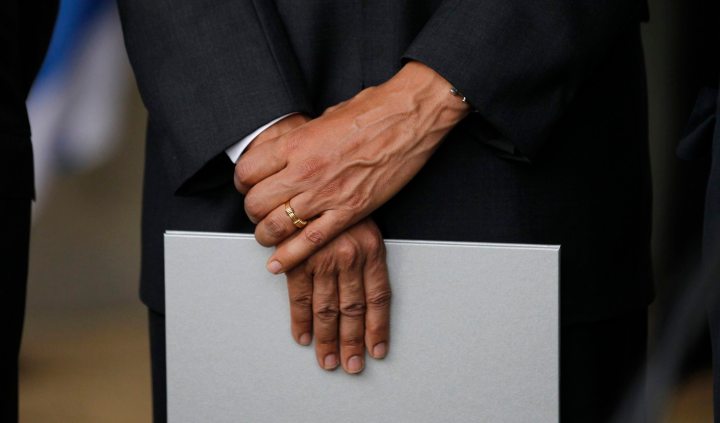World
Obama’s Middle East adventure: Soft gloves, hard punches

One has to hand it to Barack Obama and his administration’s spinmeisters: for weeks they systematically undercut any sense there would be real outcomes or surprises from Obama’s first presidential trip to Israel – and his first major, contentious international foray since winning his second term of office, except for that short visit to Burma/Myanmar after the election. BY J BROOKS SPECTOR.
In fact, by treating most of this visit more like a domestic political journey than a foreign visit, Obama seems – at least initially – to have turned around the views by many of what his possible impact on Middle East issues could actually be. Moreover, there is at least the plausible chance that he has even begun the process of laying at least the foundation stones – yes, it’s still a very tentative thing – for one key part of that ever-elusive foreign policy legacy that tantalises and afflicts second term US presidents.
In Israel, Obama gave Binyamin Netanyahu the kind of warm, full-throated, jovial, effusive embrace in front of the media – and live on TV – that recalled Richard Nixon’s famous political advice: “keep your friends close, but your enemies closer.” There has clearly been no love lost between these two leaders for the past half decade, what with Netanyahu’s attempts to go over the president’s head in American domestic politics and appeal to supporters in Congress and among interest groups to press Obama to come closer to Netanyahu’s views on the West Bank settlements, on Palestinian statehood and Iran’s nuclear ambitions. At times, Netanyahu went about as close as a foreign leader can go in backing Obama’s opponent in the 2012 presidential election without being publicly charged with meddling in American domestic affairs.
And yet, at the two leaders’ joint press appearance on Wednesday in Jerusalem, it was all smiles, jokes, banter, word play and friendliness; assuring the world the two were effectively on the same side regarding Iran – that the goal was a non-nuclear Iran and that no options were off the table to prevent it, and, despite real disagreements over that Israeli settlements policy, both leaders were committed to solving one of the most vexing foreign policy topics around. Paradoxically, right there on Netanyahu’s home turf, Obama managed to seem more at ease and in his political element than did his host – perhaps because Netanyahu has to keep looking over his shoulder at the fractious, fragile coalition government he had finally cobbled together only days before the US president arrived at Ben Gurion Airport. By contrast, Obama’s political opponents, at least now, are almost entirely focused on the ground warfare of budgetary surgery rather than picking a fight over foreign policy – that and the GOP’s own internal battles to define the party’s persona going into 2016.
By the following day, Obama took a decided gamble to reach beyond Israeli’s notoriously squabbling political scene. Instead of spending all his time with the country’s politicians, a key point of the trip was when Obama addressed hundreds of Israeli students coming together from universities across the country. Taking the gambit seriously, the assembly had included Arab students with Israeli nationality (although not Palestinian Arabs, per se) among the hundreds of other Israeli students across disciplines and along the country’s political spectrum. In fact, regardless of one’s political temperament, a ticket to this event had apparently become the hottest, most sought-after ticket in town, according to Israeli bloggers.
If Obama had, according to press reports, distressed Palestinians with his focus on Israel’s long history, its difficult policy choices and the clear threats to its circumstances in his earlier remarks on Wednesday, at this student assembly he strenuously made the case for active support of Palestinian rights by Israeli citizens – even if the country’s politicians remain timorous. In doing this, he essentially argued that just as Israeli Jews have a strong argument to make for their right to be part of a prosperous, peaceful country, the same arguments necessarily apply just as strongly to everybody living on the other side of the line that separates Israel from the West Bank Palestinian territories.
And here was the new, even revolutionary, element that Obama has now added into the mix: If Israeli politicians can’t make that step forward it is now up to Israel’s citizens to do so – and especially young people like the ones sitting in front of him. They must push the politicians forward until they can make that crucial step. Mohammed Khalaily, a Palestinian medical student at Ben-Gurion University in Beersheba, wrote in the New York Times after the speech, “After that first tedious and dull part, Obama started talking about peace and prosperity. It was surprising, to say the least: the president of the United States using the word ‘occupation’, a term so controversial to use in the context of describing Israel’s policy in the Israeli-Palestinian conflict, a word that Netanyahu doesn’t want to hear.”
Khalaily went on: “Moreover, he stated that peace is necessary not only because it benefits the people of Israel, but also because the Palestinians deserve to live in a better reality. I definitely wasn’t expecting that from the president of the United States, the country that was Israel’s ally for decades and supported its occupation policies constantly. I did not expect Obama to be that courageous to speak the truth that the Israeli leadership was afraid to hear. Obama knows that Netanyahu couldn’t care less about resuming the negotiation process with the Palestinians. Thus, it was brilliant of him to state that it is the people’s job to demand that their politicians achieve peace.”
Not particularly surprisingly, perhaps, this is essentially the same political analysis Obama had come to embrace as his own back in his days as a community organiser in Chicago, then during his first campaign for the presidency in 2008 – and in his speeches in Accra, Ghana and Cairo, Egypt, during his first term. While not new to Obama’s political landscape, and not totally foreign to American audiences, but something very new to be expressed by an American leader to an Israeli audience right on their home territory. And his message drew repeated applause for his having done it.
It was almost as if he had said to Netanyahu and his political clique: “Okay, you can come to Washington and get a lot of congressmen to applaud your hard-line statements. You can get AIPAC and the Protestant fundamentalist groups to act like automobile dashboard bobble-head dolls, nodding on your behalf all the time, any time. But, pay attention now, I am talking to your country’s future – and I have found a way that speaks right to their hearts and to their desires for a different kind of future than the one they are facing now under your leadership.” An optimist could well argue that moment of a psychic connection might just possibly be the game changer American presidents have sought in the Middle East for half a century. Of course, lasting presidential legacies built out of Middle Eastern clay have largely proved to be great photo opps rather than lasting peace, but, still, it is only a few days away from that Obama speech, so, who really knows how this will all play out in the months ahead.
But as if to make it clear as well that the American interest in the Middle East is not solely a function of getting Israelis and Arabs to adhere to Isaiah’s injunction, “And they shall beat their swords into plowshares, and their spears into pruning hooks: nation shall not lift up sword against nation, neither shall they learn war any more,” Obama also used his time in Israel to broker a telephone rapprochement between Turkey’s Prime Minister Tayyip Erdogan and Binyamin Netanyahu. The conversation included a direct apology by Netanyahu for the fatalities during the raid on the ship that allows the two nations to bring their diplomatic relationship back from the brink.
This comes after a nearly three-year downward spiral in the wake of the botched Israeli interception of a humanitarian relief vessel, the Mavi Marmara, sailing to Gaza from Turkey, and in which Turkish citizens were killed and Israeli Coast Guard personnel were wounded. Over the weekend, Erdogan pointed to that apology as evidence of Turkey’s new clout in the region, although it could just as easily be argued this “kiss and make up” moment was a demonstration of the need to get two squabbling American allies to stop the “he said/she said” and move onto dealing with more important things – like the coming collapse of civil order in Syria.
Crucially, this restart between these two American-allied nations allows for a more calibrated, coordinated response to the on-going disaster that is Syria – a country that is both Turkey and Israel’s neighbour. Turkey is already receiving many hundreds of thousands of refugees from the fighting (at a growing social and budgetary cost). Meanwhile, Israel is monitoring the ongoing civil war with a close eye on whether it could bring chemical or biological weapons into use or let them fall into the hands of irregular forces that might use them against Israel; lead to the collapse of civil order completely in Syria with the unpredictability of things thereafter; or even allow for a growing penetration by Hezbollah forces on Israel’s generally quiet North-eastern frontier and demilitarised zone along the Golan Heights as a result of the growing chaos.
By the time Obama arrived in Jordan for the final leg of his trip, he used the public aspects of his time with Jordan’s King Abdullah – another key American ally in the region – to reiterate the importance of dealing with the Syrian civil war. Here Obama noted that the cost to Jordan for hosting refugees in that country from the fighting in Syria was growing sufficiently such that American economic stabilisation aid would be substantially increased to help Jordan to cope with those pressures.
At least for the moment, Barack Obama’s visit to the Middle East successfully overachieved the low expectations bar that had been so firmly put into place. As the Washington Post’s Dana Milbank observed, “The trip was so successful that it could provide Obama with a road map (to use the moribund term from peace talks) for success in his second term in areas beyond the region. Call it the triumph of low expectations: When your goals are less ambitious, they are easier to meet.”
In this, Obama got American allies – Israel, Turkey and Jordan – facing roughly in the same direction. He simultaneously injected some energy into Israeli domestic pressure vis-a-vis Bibi Netanyahu’s political and policy ambitions, thus reminding Netanyahu he has to carry out his administration while under the watchful gaze of people concerned about the country’s future, as well as pressures that arise from the ambitions of other politicians and parties of the political right. Judged in light of these admittedly still-largely intangible achievements, maybe the Palestinians’ cause got a bit of a boost as well from last week’s jam-packed foray into the Middle East by Barack Obama.
Now comes the harder parts, the ones that become the long slog for people like newly-confirmed Secretary of State John Kerry who will make their trips to the region and carry on with the hard task of negotiating their way through the thicket of groups lobbying for help in the Syrian conflict, in addition to evergreens like the Palestinian cause and Iran’s nuclear ambitions. And all of this, of course, has to happen without opening up a gap for Republicans to use any failure in dealing with the region as a club to beat up the president, accusing him both of foreign policy failure and an inattention to domestic issues and the still-fragile economic recovery. DM
Read more:
- A Corker of a Speech, at the Economist
- With Obama as Broker, Israelis and Turkey End Dispute, at the New York Times
- Erdogan says Israeli apology shows Turkey’s new clout, at Reuters
- Israeli Students Reflect on Obama’s Speech, at the New York Times
- Obama in Israel: The presidential tourist, Dana Milbank’s column in the Washington Post
Photo: U.S. President Barack Obama holds a souvenir book presented to him by Chairman of the Yad Vashem Directorate Avner Shalev during Obama’s visit to the Yad Vashem Holocaust Memorial in Jerusalem, March 22, 2013. REUTERS/Jason Reed


















 Become an Insider
Become an Insider